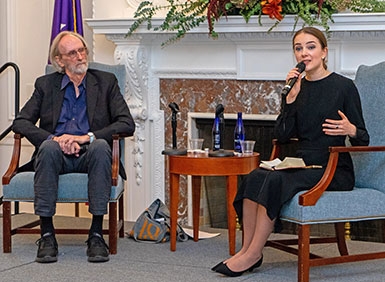Nobel laureate Oleksandra Matviichuk discusses human rights in Ukraine and the need to fight “very honestly for each person”
In a public conversation at NYU Law on October 25, Ukrainian human rights lawyer Oleksandra Matviichuk discussed Russia’s invasion of Ukraine and the role of law in wartime with Stephen Holmes, Walter E. Meyer Professor of Law. Matviichuk heads the Center for Civil Liberties, a Ukrainian nonprofit organization that was awarded a 2022 Nobel Peace Prize for its work documenting war crimes and human rights abuses in Russian-occupied Ukrainian territory.
The Center’s documentation efforts first began, Matviichuk related, during the Euromaidan demonstrations in Kyiv in early 2014, after then-president Victor Yanukovych announced the renewal of ties to Russia. During large-scale protests, more than 100 people were killed in clashes with police. Matviichuk recalled the struggle to provide legal assistance to detained protestors and to collect evidence of the killings. “We received the documents, the photos of documents, pictures of these dead bodies,…trying hard to identify these people and to make a list, to preserve the evidence and not to allow the government in future to hide these atrocities,” she said.
How can lawyers function, Holmes asked Matviichuk, when the state thwarts the rule of law? Even in those conditions, she responded, lawyers and activists can still have power. “This was a time when we faced against the whole state machine….. They wanted to liquidate the whole protest, even physically. It was so easy to say, ‘What can I do when the law doesn’t work?’ But our lawyers and our volunteers fight very honestly for each person…. And suddenly we really [started] to work not just on a legal but on a symbolic level.”
“There is no guarantee in our life,” Matviichuk explained. “You can be beaten, you can be arrested, you can even be killed. But there are people who will fight for you, who will never [leave] you alone, who will do their best to release you, and will never forget about your family. And this helps people to overcome the fear and continue the struggle.”
Russia’s attacks on Ukraine, she said, came in response to her country’s efforts to transition to democracy after Euromaidan. “Putin is not afraid of NATO,” Matviichuk said. “Putin is afraid of the idea of freedom, which came closer to Russian borders nine years ago.”
As a clash between authoritarianism and democracy, the Russia-Ukraine conflict has broad geopolitical significance, she argued. “Putin started this war of aggression, he tried to show that a country with a strong military potential and nuclear weapon can break international order, can dictate the rules to entire international community, and even forcibly change international recognized borders,” Matviichuk said. “And if Russia succeeds, it will encourage other authoritarian leaders in the world to do the same…[and] we’ll find ourselves in a world which will be dangerous for everyone without exception.”
Watch the conversation between Stephen Holmes and Oleksandra Matviichuk:
Posted November 3, 2023


